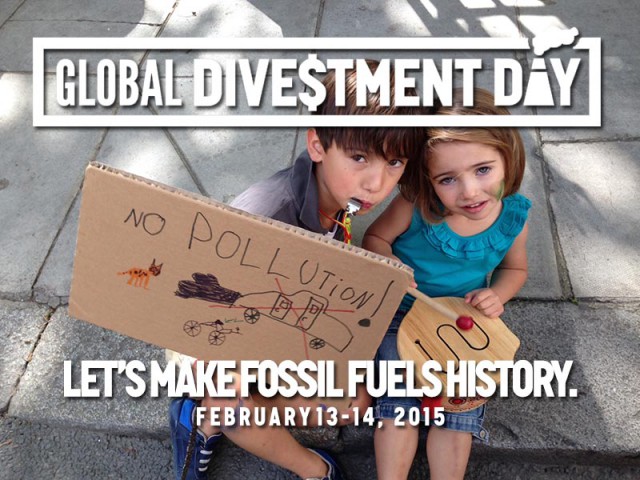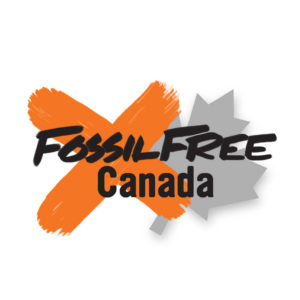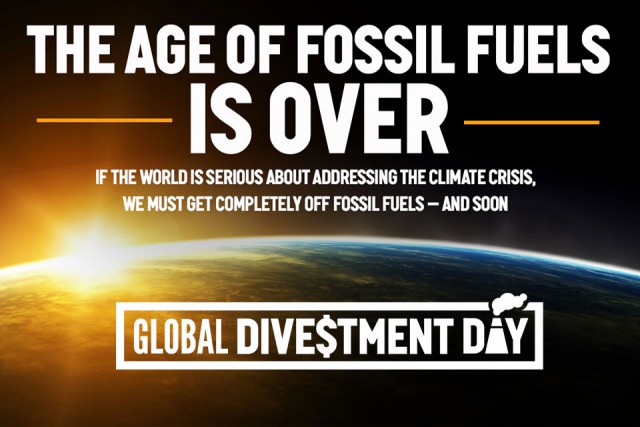 Money talks, and are we ever loving what it has to say these days.
Money talks, and are we ever loving what it has to say these days.
Over the last two years, a combined $50-billion has been divested from the global fossil fuel industry.
That means today there is $50 billion less behind the coal, oil and gas companies whose actions threaten the future of our planet and whose political clout stifles the development of sustainable energy solutions.
It’s become the fastest growing divestment campaign in history, and, with the goal being a fossil-free world powered by renewable energy, it’s arguably the most important one our planet has ever seen.
As part of this growing movement, the first-ever Global Divestment Day is happening Feb. 13 and Feb. 14 and we’re encouraging people, institutions and companies in New Brunswick to take part in this exciting and worthy campaign.
What is divestment? Simply put, it’s when someone gets rid of stocks, bonds or investment funds because they are unethical, morally wrong, or just plain too much of a financial risk.
Hundreds of Divestment Day events are being organized next month across five continents to call upon people, governments and institutions to pull their money out of the fossil fuel industry and put it into renewable energy.
The idea is straight-forward enough. Organizers say the financial might of the fossil fuel lobby has shackled our political process. People, therefore, need to confront that financial power with a force of their own: pulling money away from oil and gas companies and throwing it behind renewable energy solutions.
The more people and institutions who do it, the more fossil fuel companies will been seen as outdated, rogue corporations without a social license to continue putting profit ahead of people and the planet.
Historically, divestment campaigns have been powerful engines for social and economic change. Recently, they’ve been used successfully for campaigns against violence in Darfur and against advertising by the tobacco industry, but the largest and most meaningful divestment campaign was used in the mid-80s to break the back of the Apartheid government in South Africa and usher in an era of democracy and equality.
We believe the Fossil Fuel Divestment Campaign will usher in a new era of sustainability and climate justice the world over. To date, at least 181 institutions and more than 650 individuals have divested from fossil fuels. In New Brunswick, students at the University of New Brunswick in Fredericton and Mount Allison University in Sackville have joined the call, urging administrators to remove fossil fuel interests from university endowments.
Both campuses are organizing Divestment Day events, and we encourage members living in those regions to come out and help amplify the call for our public institutions, private businesses and local and provincial governments to go fossil free. We’ll provide details on these events when they become available.
It’s likely that the first groups to divest back in 2012 did so for moral and ethical reasons. More and more, though, investors are realizing there is a compelling business case for shifting away from coal, oil, and gas, too.
Beyond the increasingly high price tag associated with the impact of rising sea levels and extreme weather events caused by climate change, smart investors are reading the writing on the wall.
This fall, Norway’s largest manager of pension funds, KLP, sold off all its investments in coal companies, instead opting to invest half-a-billion kroner (around USD 75 million) in renewable energy ventures.
And here in Canada, the Catherine Donnelly Foundation – the financial legacy of the remarkable women’s religious group, The Sisters of Service – pulled its investments from coal, oil and gas. “As governments and global accords debate various restrictions on the Fossil Fuel industry, we feel these investments are becoming increasingly risky while the green energy sector continues to demonstrate excellent potential,” noted the foundation chair, Jason Dudek.
 In an article published in the Globe and Mail in December, Jeff Rubin, former chief economist of CIBC, said he divested from the Alberta tar sands not to save the world, but rather, “to save my portfolio,” noting investments in dirty energy sources will only get riskier as the world inevitably moves toward hard action on climate change.
In an article published in the Globe and Mail in December, Jeff Rubin, former chief economist of CIBC, said he divested from the Alberta tar sands not to save the world, but rather, “to save my portfolio,” noting investments in dirty energy sources will only get riskier as the world inevitably moves toward hard action on climate change.
The high-profile cases go on. This September, the heirs of the Standard Oil fortune described the situation even more bluntly when explaining their reason for divesting the Rockefeller Brothers Fund’s fossil fuel interests:
“John D Rockefeller, the founder of Standard Oil, moved America out of whale oil and into petroleum,” Stephen Heintz, president of the Rockefeller Brothers Fund, said in a statement. “We are quite convinced that if he were alive today, as an astute businessman looking out to the future, he would be moving out of fossil fuels and investing in clean, renewable energy.”
Ed Davey, Britain’s energy and climate change secretary, made similar remarks to The Guardian in December, saying “we are seeing a move from carbon capitalism to climate capitalism.”
For conservationists, activists and climate scientists alike, these are incredibly powerful statements, indicating the first signs of a significant shift in political and financial policy.
2014 was a big year for climate action. Between the hundreds of thousands of protesters who filled streets around the world for climate justice in September, the historic climate agreement signed between the U.S. and China in November, and the creation of the Lima Accord which for the first time calls on all nations to limit their emissions, there were many reasons to celebrate the past 12 months.
Let’s keep that momentum going. Get behind Divestment Day and let’s make 2015 the year fossil fuels become history.
Part of our Renewable Solutions NB Project



